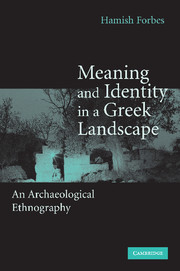Book contents
- Frontmatter
- Contents
- List of Illustrations and Tables
- Preface and Acknowledgements
- Transliteration Conventions
- 1 Introduction
- 2 Landscape Studies: From Frame-and-Tame to Visceral Feeling
- 3 Historical Background to the Landscape of Methana
- 4 Conducting Fieldwork on Methana
- 5 Kinship, Marriage and the Transmission of Names and Property
- 6 The Productive Landscape
- 7 The Historical Landscape: Memory, Monumentality and Time-Depth
- 8 The Kinship Landscape
- 9 The Religious Landscape
- 10 Conclusions: A Greek Landscape from Within
- Glossary
- Notes
- References
- Index
4 - Conducting Fieldwork on Methana
Published online by Cambridge University Press: 04 May 2010
- Frontmatter
- Contents
- List of Illustrations and Tables
- Preface and Acknowledgements
- Transliteration Conventions
- 1 Introduction
- 2 Landscape Studies: From Frame-and-Tame to Visceral Feeling
- 3 Historical Background to the Landscape of Methana
- 4 Conducting Fieldwork on Methana
- 5 Kinship, Marriage and the Transmission of Names and Property
- 6 The Productive Landscape
- 7 The Historical Landscape: Memory, Monumentality and Time-Depth
- 8 The Kinship Landscape
- 9 The Religious Landscape
- 10 Conclusions: A Greek Landscape from Within
- Glossary
- Notes
- References
- Index
Summary
Aghiou Nikolaou [Saint Nikolas' day]. Coldish north wind and overcast…. Today we went to collect wood underneath [the landlord's] huge almond tree … after we [had] had a grumble campaign in the village about the wood that [his wife] burnt, and how we wouldn't have any for the rest of the winter…. I guess the word must have got back to them, as we hoped it would.
(Field notes, 6 December 1972)CULTURAL ECOLOGY STUDIES
Because this book is an ethnographic exploration of the meanings of landscapes, I include in this chapter some of my own personal background with its particular cultural baggage before describing my methodology. The information represents some of my ‘qualifications’ for understanding the meanings of Greek rural landscapes, the reasons I understand them in the ways that are presented here, and an explanation of some of the fieldwork methods employed. Although in the past the ethnographer may have been perceived as a dispassionate and unbiased observer, an element of reflexivity is now generally expected of Anglophone writers of ethnographic studies (see, e.g., Johnson 2000, 304; also Clark 1988, 3–16, in the context of her fieldwork on Methana). As Clark (1988, 3) notes in the introduction to her study of Methana households, factors such as the age, gender, marital status, personality, and cultural and educational background of the researcher affect which windows into a community will be open to him or her and which will be closed.
- Type
- Chapter
- Information
- Meaning and Identity in a Greek LandscapeAn Archaeological Ethnography, pp. 97 - 115Publisher: Cambridge University PressPrint publication year: 2007

